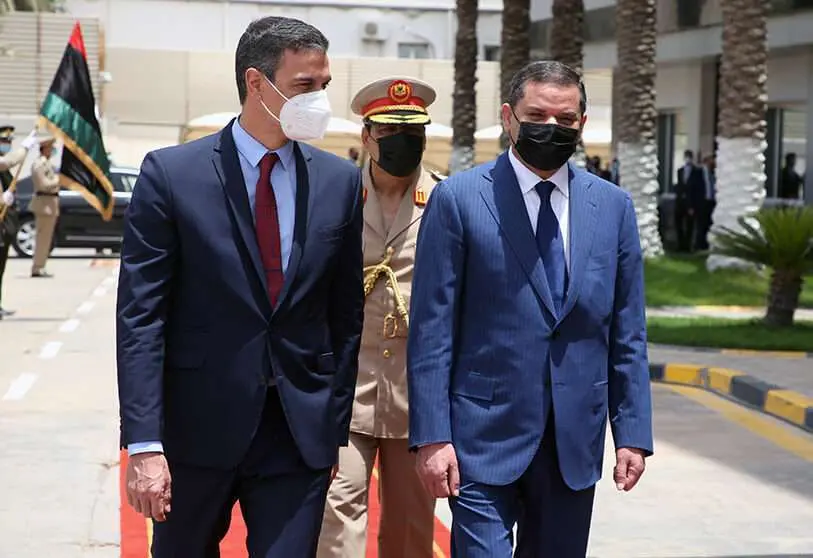Pedro Sánchez visits Tripoli and announces the reopening of the Spanish embassy in Libya

This Thursday, the President of Spain, Pedro Sánchez, was received in Tripoli by the Prime Minister of the Libyan Government of National Unity, Abdel Hamid Dbeiba. He received Sánchez and his accompanying delegation at the Cabinet Office in the Libyan capital. Sánchez also plans to meet with the President of the Presidential Council, Mohamed al-Manfi, during his visit to Tripoli.
Earlier, the Spanish Embassy in Tripoli reported that the Spanish Prime Minister would make an official visit to Libya, accompanied by a high-level delegation represented by authorities such as the Spanish Minister of Foreign Affairs, Arancha González Laya, and the Secretary of State for Trade, Xiana Margarida Méndez. He also met with the Chamber of Commerce, a group of businessmen and some executives of large companies.
The Embassy indicated that this visit is a historic opportunity to extend the ties of cooperation and friendship between the two countries, through the signing of several memorandums of understanding in various fields; in addition, the Spanish President will reopen the Spanish Embassy in Libya.

Dbeiba announced in a statement televised by 218 News that "our relationship with Spain is experiencing a new era and we welcome the opening of its Embassy in Tripoli". He added that the restoration of air traffic between Libya and Spain and the granting of visas to Libyans is expected. We appreciate the European and Spanish efforts to support Libya in reaching elections and protecting national sovereignty.
Both countries have agreed to activate the work of the joint committee to re-evaluate previous agreements and that several pacts will be signed that contribute to boost work in economic matters, education, scientific research and health. "Libya hopes to have strategic relations with Spain as a friendly country to exchange benefits between the two parties," he announced.
He added that "we are facing many security challenges related to maintaining the ceasefire, and we seek to consolidate the ceasefire, unify the military institution and reduce illegal immigration". "We have many areas of cooperation with Spain, and we agreed to activate the joint committee between the two countries, and Libya is going through a difficult period and we will support it to get back on the right track," he continued.

For his part, the Spanish President demonstrated Spain's support for the Libyan elections to be held next December, "Libya is going through historic times and Spain wants to be on its side". "We have reopened our embassy in Tripoli and we are contributing to everything that leads to stability in Libya", he announced. And he noted that Spain will continue to support and finance demining operations in Libya.
Dbeiba valued all the efforts made by the European Union and Spain to strengthen security in the Mediterranean, secure the borders, promote stability and support the democratic transformation of Libya through the achievement of a Constitution and free, transparent and fair elections.
He stressed that the sovereignty, independence, territorial integrity and unity of Libya, in all parts of the country, east, west and south, is the basis of his country's cooperation with Spain and the European Union and its strategic relations in the Government of National Unity.
In addition, the Prime Minister thanked the Spanish government for agreeing to treat several children with cancer in Spanish hospitals. In conclusion, Dbeiba reiterated Libya's aspiration to build strategic relations with all friendly countries, hoping that the relationship with Spain will be a positive example of how the relationship between friends should be and what can be achieved for mutual benefit.

Many countries around the world are working to reopen their embassies, consulates and missions to work inside Libya, as the formation of the country's new executive authority was announced on 5 February by the Political Dialogue Committee in Geneva.
Moreover, Sánchez is the third Spanish prime minister to visit Libya after José María Aznar, who did so in 2003, and José Luis Rodríguez Zapatero twice in 2010, although the second visit is on the occasion of the EU-Africa summit.
Both Aznar and Zapatero held meetings with the late Colonel Muammar al-Gaddafi at the time, and Sánchez would be the first Spanish minister to visit post-Gaddafi Libya. He is also one of the first European leaders after the EU delegation reopened its mission in Tripoli on 17 May.








